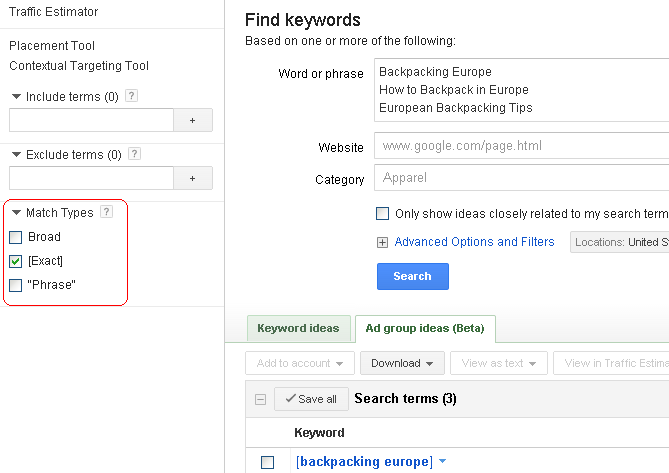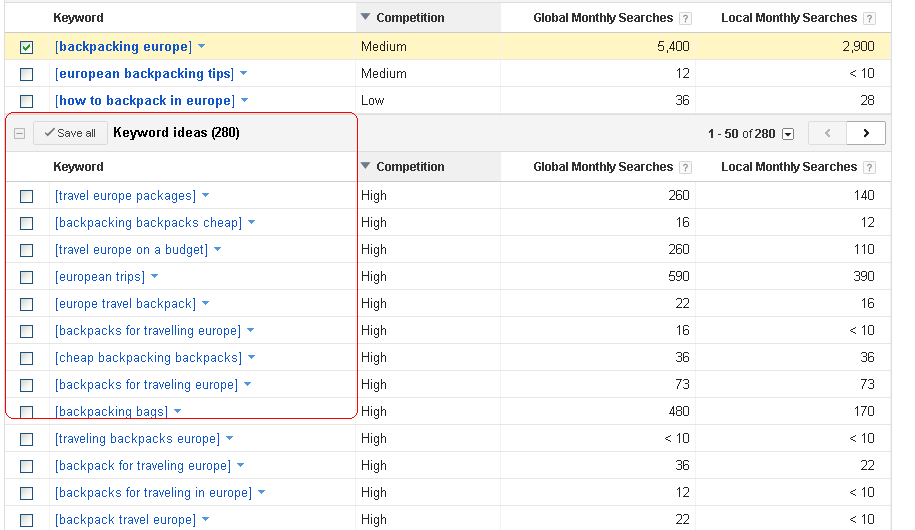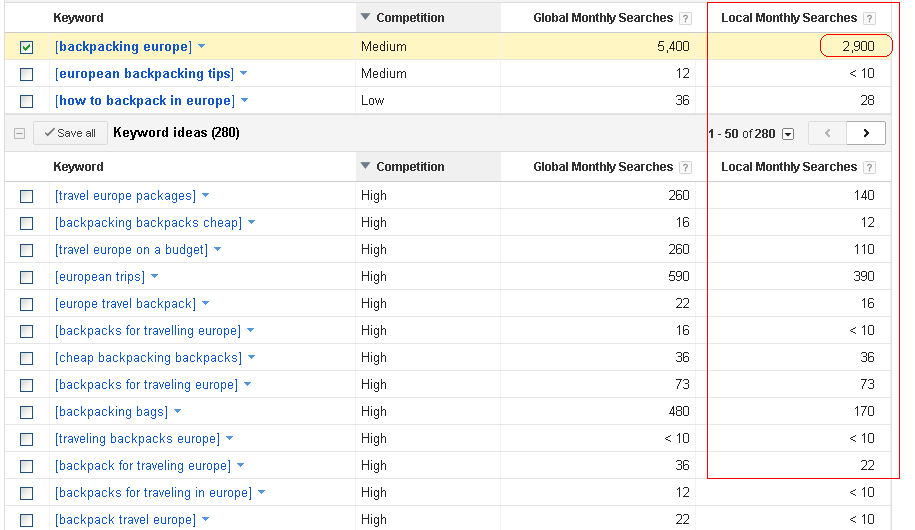If you have already taken the steps to starting a blog then you should know that keyword research is critical to your success. The goal of the following article is to make keyword research both accessible and easy. There are many articles that will teach you advanced techniques for keyword research but this is not such an article.
In this article we will cover the very basics of keyword research will include 6 main areas. These areas are as follows:
- Brainstorming a list
- Knowing you need a keyword tool and which to use
- Refining your list to the best keyword phrases found from your keyword analysis tool
- Keyword phrase relevance
- Find consumer demand by looking at search volume of keywords
- Taking a look at the competition
In simple terms, you are looking to get together a group of keywords which are very targeted and have high search volumes with low competition. You will want to find a keyword phrase which many people are searching for that does not have many competitors with authority competing for that same phrase.
Brainstorming The List
Many times the keyword research for a site will begin with an optimizer who comes up with a list of keywords or phrases that they think people are searching for or that they think describes their website content.
There are times when this list of words is based on research but the majority of the time they are pulled out of nowhere and are keywords that the company wishes people used to describe their content or services. Often is the case that these words are not the keywords the actual public is using.
Call to Action
You should start off the process of keyword research with a brainstormed list like previously mentioned. You will want to think about how people that use your services or read your content would describe them if they were searching for such things. Think of different stems such as “How to” that people would use to find your site. Are local modifiers important to your service? If they are, add locations to the list followed by keywords that describe the service. Basically, come up with a list of keywords that you think best describes your content and services.
Selecting and Using a Keyword Research Tool
During the process of keyword research you will take your list of brainstormed keywords or phrases and find out which of them have the best chances of earning you top SERP results and are also attainable and have high searches.
This post is not about the tools you can use but you must understand that you must have a keyword research tool at your disposal to go through your keyword data.
All that is covered in this article can be done with the most basic keyword research tools such as the Google Adwords Keyword Tool (now the Google Keyword Planner). However, there are much better paid tools such as WordTracker that will give you an advantage in keyword research by giving insights for Bing and Yahoo! and Google as well as giving you a nice laid out in-depth analysis.
Call to Action
You can enter in all the words that you have brainstormed into the keyword tool of your choice one at a time but I would recommend that you use batches of 10 keywords or phrases at a time. This will make the entire process faster and easier.
Whenever I help someone with using the AdWords Keyword Tool there is always one mistake that I see over and over again. You must select the “Exact” keyword matches in the left sidebar. When you select “Exact” the tool will show you how many people searched for that exact phrase in Google alone. The tool will then give you a list of results that are closely related to the phrase you have just entered.

You will want to take the phrases that are suggested for you and add the good ones to your list that you are brainstorming. This will help you find related phrases that might also be highly searched.
Refine Your List with Keyword Suggestions
In every keyword research tool that you will use, they will give you keyword phrases that are very close to your original query as suggested keywords. In the free AdWords keyword tool, they call them keyword ideas.
Taking careful notice of suggested keywords in this area is very important. This can give you an insight of how customers are searching for specific products. With this information you can refine as well as continue to build your keyword list.

Do Your Keywords Accurately Describe Your Content?
During the time that you are looking at the suggestions for keywords, many people fall into the trap of focusing on the high volume keywords even if they do not accurately describe your content or product. You want to make sure that the keywords you select are both high volume AND relevant. The relevance to your product or content is the most important thing here.
If you stumble across a keyword phrase that does not really describe the content on one of your pages but it is related to your topic, the best thing to do is to create a new page on your site with the keyword phrase. Keyword research should help with your content strategy, not the other way around!
Always write for people, not search engines. You should always be thinking about what the user is searching for when they type in a specific query.
Check the Volume — Is it popular?
If you check out the search volume of a particular keyword term, it will tell you how many times in the month that keyword phrase was searched for in Google. Other tools will display this information for other search engines but when you use the AdWords Keyword Tool, that is what you will get.
If you find an exact phrase that has a high volume, it tells us that there is a high demand for that product of that information. It also shows us the language that is being used to look for that product or information.
To find these high volume terms, you need to find out what is in demand and what language is being used to find things. Make sure to optimize your pages on your site to include terms that users are searching for. This will give search engines such as Google the chance to see that your site is a relevant source for users looking for that information.
Call to Action
Make sure to look at the Local Monthly Searches in the Google AdWords Keyword Tool. There is no secret formula for what the best search volume for keywords is. The best search volume is going to be subjective to different websites and products.
Some search terms are going to be long tail keywords. These are going to be searched for much less than a one or two word phrase but the visitor is going to be much more targeted if they come from long tail keywords. I do not know about you, but I would rather have 100 targeted visitors come to my site instead of 1000 targeted that will leave right away. Remember, you want traffic that will convert.
The best of both is going to be keywords in the keyword idea section that are going to show high search volume and be long tail keywords. These types of keywords are the ones you should be focusing on as they will be the most targeted and will convert the best.

Competitive Analysis
The very last step is looking at competitors and analyzing the competition for specific keywords. This is done by looking at what the SERP is turning out.
If you want to get an idea of how competitive the keyword you are trying to rank for is, open up a new page and enter your phrase into Google.
Do you see sites that offer similar products to yours? Perhaps you see big brands on the first two pages. Maybe you even see results on the front page that have nothing to do with your product.
Do you see results similar to your product or content?
Awesome, this means you are on track. Look at other sites that are ranking on the first page for this phrase. Take note of who is competing with you in the top ten and then take a look at the top three. Look at what they are doing with their pages and what kind of language they are using to convert visitors. The best chance to beat your competition is to do things that they are doing wrong, right! Do these sites have the keyword phrase in their body, description and title? If not, add it to yours and you are one step closer to being first.
If you want to get a better detailed view of the top ten, go to Google and enter the search “Allintitle:keyword”. The keyword is going to be the keyword phrase that you are targeting. This will show you the web pages that have that keyword in their title tag. What this means is that these are the websites that are taking the time to optimize for that specific phrase.
Authoritative brands in the top ten?
Every spot you are away from number 1, the more click throughs to your site you are never going to see. I want to be very honest to you when I say that you have a slim and usually no chance at all at beating huge brands such as Microsoft or Adobe for the first few spots. I would spend my time on other keyword phrases if I saw huge brands in the top three.
No results with similar services or products in the top ten?
It may be possible that the keyword phrase you are trying to search for can mean two completely different things. If you search your keyword phrase and see nothing related in the top ten, you have found one of these keywords. If your webpage makes it to number one for this term, it might not be as targeted as you want it to be. Non targeted traffic is not very useful so I would find another keyword to target.
Choose the Best Keywords
If you want to compete with other sites and become number one in the SERPs you will need to have keyword rich content, descriptions and meta titles. If you are going to take the time to target specific phrases, you should also take the time to figure out if that is the right language being used to find your information or product.
Make sure that you are optimizing on the data you have available to you. If you are optimizing based on your hunch, you are doing it wrong.



